A cross-platform approach to app development can result in up to 75% of shared code, according to a study.
The industry for developing native and cross-platform apps has advanced greatly since the debut of the first app in the early 1980s.
Today, we have cross-platform apps that are fiercely competing in the market as well as native apps for certain platforms that have been shown to perform better.
But here’s the thing: both native and cross-platform methods for developing apps have advantages and disadvantages.
Although native apps are more sophisticated than standard mobile apps, they cost the same and take the same amount of time to develop.
In order to make the process of developing apps more effective, quick, and adaptable, contemporary techniques like cross-platform mobile app development have risen to the fore.
You may create an app that works equally well on many platforms with the assistance of a cross platform app development business that is knowledgeable about the trade secrets.
Cross-platform programmes can operate on numerous platforms with just one codebase. The best cross-platform app development firms create hybrid apps that function on iOS and Android devices using frameworks like Flutter, Ionic, React Native, Xamarin, PhoneGap, etc (Eg: the Facebook app).
Choosing the Right Cross Platform App Development Company as Your Ideal App Partner
Although there are millions of mobile app development businesses offering cross-platform app development services worldwide, finding the industry leaders may seem impossible for an immediate need.
This research assesses the mobile app developers who offer the finest cross-platform mobile development solutions to clients worldwide, in an effort to alleviate any such complaints.
You can choose the cross platform mobile development firm by using the descriptions and information provided below about the agencies.
What Does Cross-Platform Development Mean? or Who is a Cross-Platform Developer?
The process of creating software for a variety of operating systems or software environments is known as cross-platform development.
Engineers and developers employ a variety of techniques to adapt a single application or product to several operating systems or settings.
The goal of cross-platform development is to create software that functions well across many digital environments. In order to market software for more than one proprietary operating system, such as to support use on both Microsoft and Apple platforms, this feature is often pursued.
More forms of cross-platform development have emerged as a result of the growth of mobile devices and other platforms, as well as open-source technologies like Linux.
Making distinct compilations of the same programme for other operating systems, or in other circumstances, using sub-tree files to adapt or fit the product to various operating systems, are some of the key tactics for cross-platform development.
Making the programme abstract at specific levels in order to support various software environments is another important strategy.
This kind of software is “platform agnostic,” meaning it doesn’t favor or support any particular platform.
Application programming interfaces (APIs) are a tool that developers can use to adapt a piece of software for a particular platform.
Cross-platform development generally results in less efficient programmes. For the many systems that it’s designed to support, it might call for duplicate procedures or file storage folders, for instance.
Additionally, it could be necessary to “dumb down” a programme to work in less sophisticated software environments.
However, software developers have often come to the conclusion that overcoming the drawbacks of cross-platform development is worthwhile in order to make their programme available to a larger user base.
Which is The Best Approach For Cross Platform App Development?
The advantages of cross-platform app development are significant contributors to its present popularity.
Along with every other mobile app development business attempting to get their hands on this intriguing and unique technology, a number of cross-platform app development tools and frameworks started to float in the market as its reach increased.
As a developer, you may find the sea of these tools and frameworks we now have to be daunting.
Here is a list of the top cross-platform app development frameworks that are a sure thing for you to choose for product development, including node.js, react, flutter, PhoneGap, and others, to aid you in your search for the most excellent and perfect cross-platform framework.
To put it simply, cross-platform software is a type of programme that can function on a variety of operating systems, including Android, iOS, Windows, Blackberry, etc.
The apps developed using this framework just need to be coded once to lay the groundwork for them to function as effectively across all platforms.
Almost all of the major mobile app development service providers swear by it, making it one of the most well-liked ways in the app development industry today.
What Are Some Cross Platform App Development Examples?
Cross-platform development: what is it? Apps that work across different platforms are called cross-platform. The apps make the most of code reuse, which inevitably brings down maintenance and development expenses.
The app’s native components ensure a faultless user experience and excellent performance at the same time.
Software that is intended to run on many computing platforms is referred to as cross-platform software, also known as multi-platform software, platform-agnostic software, or platform-independent software.
Some cross-platform software needs to be built separately for each supported platform, whereas others can be run directly on any platform without the need for additional setup because they were written in interpreted languages or compiled to portable bytecode whose interpreters or run-time packages are common or standard components of all supported platforms.
A cross-platform application, for instance, might function on Linux, macOS, and Microsoft Windows. Software that runs across multiple platforms can do so, or it can only run on two. Codename One, Kivy, Qt, Flutter, NativeScript, Xamarin, Phonegap, Ionic, and React Native are a few cross-platform development frameworks.
What Are the Benefits of Cross Platform App Development Frameworks?
– Widest Possible Exposure to the Target Market
By using a cross-platform mobile development methodology, you may create an application and distribute it across several platforms, including the web. This suggests that one can target both the iOS and Android platforms when developing a single application, so broadening their market.
– Decreased Cost of Development
The principle of “compose once, run everywhere” underpins the creation of cross-platform applications. The cost of development can be decreased by using reusable codes and agile application development techniques. Cross-platform applications are the only option if you want to effectively improve your business across a variety of platforms and technologies.
– Easier Deployment and Maintenance
Because there is only one built programme that operates across all platforms, it is easier to keep up with developments and submit updated code. Time and money can be saved by quickly synchronizing updates across all platforms and devices. Additionally, if a bug is discovered in the main codebase, it should only need to be fixed once. In this way, developers can make significant time and financial savings.
– Quicker Development Process
Another example where both parties can benefit is when developing cross-platform applications quickly. Using a single source of code across many platforms can cut development time by 50 to 80 percent. It helps you obtain a feature-rich commercial application more quickly. The team of developers is able to meet the deadlines in cross-platforms application development.
– Useful Code
The code can be used repeatedly, which is another advantage of this platform. Developers can reuse a single code rather than writing fresh code for every platform. This avoids recurrence in the task of creating codes, saving time and resources.
– Easy Cloud Integration
Cross-platform mobile applications can utilize various plugins integrated with cloud settings and are completely compatible with one another. In order to increase the application’s usability and scalability, several plugins and extensions are combined into a single source of code.
Top 10 Best Cross Platform App Development Frameworks
1. Ionic
Based on AngularJS, Ionic is one of the most outstanding and well-liked cross-platform app frameworks. It enables programmers to access native platform controllers by combining the leading programming languages, including HTML5, JavaScript, and CSS, with the Cordova wrapper.
Ionic gives developers the ability to design a brilliantly inventive user interface and incorporate user-friendly elements into the app. Ionic is the ideal framework for PWA development because the apps created with it are extremely dynamic and native-like.
– It is an open-source front-end framework, allowing changes to the code to meet each developer’s needs and saving a tonne of time. This puts its rival Ionic, who is competing against React Native, up against stiff opposition.
– A SAAS UI framework created exclusively for mobile operating systems serves as the foundation for Ionic. It offers a variety of UI components for building strong applications.
– Its foundation in AngularJS, which makes it simple to offer extensions to HTML’s syntax and fundamental functions to incorporate practical yet appealing features and components into the project, is another of its most praised aspects.
This framework makes use of Cordova plugins, which is one of the key advantages of cross-platform development tools. These plugins give users access to built-in functions like the camera, GPS, and audio recorder. Ionic is a favorite among developers since it gives the apps a native-like experience. It enables the creation of cross-platform programmes and ensures their flawless performance across numerous platforms.
2. React Native
It is difficult to leave out React Native while discussing cross-platform app frameworks. It is a JavaScript framework that is used to create real code and offer mobile applications that function on both Android and iOS a native-like feel. Because of React Native’s exceptional features, corporations as well as developers favor it as the best platform for their apps.
React Native combines the advantages of JavaScript and React.JS while also giving developers the option to write modules in Objective-C, Swift, or Java. Additionally, by utilizing native modules and libraries in the cross-platform React Native apps, developers may carry out labor-intensive tasks like image editing, video processing, and other tasks that are not covered by the framework APIs.
– It is advantageous because React Native, like Ionic, is an open-source cross-platform app framework. As a result, it has a sizable community that helps it by resolving issues, improvising, and adding features.
– One benefit of cross-platform development is that it just calls for one-time coding (WORA) when creating apps for different platforms like Android and iOS. This overcomes one of the greatest problems with prior frameworks, which was that it required programmers to write code twice for the same project on many platforms.
– One-time coding cuts the app’s development time in half and keeps the expense of creating a React Native app to a minimum.
Impressively, React Native has excellent compatibility with external plugins like Google Maps. React Native places a strong emphasis on the user experience, producing a very responsive interface. It means that the React Native ecosystem eliminates loading time and gives applications a fluid user experience.
3. Flutter
In 2017, Google unveiled the remarkable Flutter cross-platform app framework. It is a software development kit created to aid in the quick development of Android and iOS apps. A crucial and important technique for creating Google Fuschia apps is this one.
Flutter provides apps that operate smoothly and dynamically across a variety of platforms.
The following are some exceptional qualities that make Flutter a popular cross-platform framework with developers:
Flutter encourages the use of portable GPUs, which render UI power and enable it to function on the newest interfaces.
– Because Flutter is a reactive framework, it does not necessitate manually updating the UI contents. The only thing that Flutter app developers need to do is update the variables; the UI modifications will then be displayed.
The cross-platform software framework Flutter presents as the ideal option for creating Minimum Viable Products (MVP) because it starts a quick development process and is also reasonably priced.
– The programmers can understand the changes to the code and effectively recreate a widget tree automatically.
Flutter includes a built-in graphics engine. As a result, the developers wouldn’t have to deal with the hassle of creating different interfaces for Android and iOS.
4. Xamarin
The cross-platform app development frameworks offered by Xamarin differ greatly from the ones we have previously reviewed. It is a simplified framework that uses C# and.Net instead of JS libraries and HTML to create programmes for Android, Windows, and iOS. 90% of the code can be used by the developers to create an app for three different platforms.
Timely Interest in Xamarin
With the aid of its incredible APIs, Xamarin creates applications that look and feel like native apps, which makes choosing between Xamarin and React Native much more difficult. Here are some of the characteristics of Xamarin that help to explain why it is one of the top cross-platform development tools for mobile development.
The Xamarin framework uses C#, a cutting-edge cross-platform app development language that has an advantage over Objective-C and Java, to build apps.
With Xamarin, developers receive access to native-level app capabilities. With the aid of plugins and particular APIs that integrate with common device functions, it greatly eliminates hardware compatibility issues. In order to enable customisation and native-level capabilities, it also encourages linking with native libraries. It is one of the best Android app development frameworks just based on this functionality.
– Xamarin supports the direct integration of libraries written in Objective-C, Java, and C++. This makes it one of the significantly finest cross-platform frameworks because it enables developers to utilize various third-party codebases written in Java, Objective-C, or C++.
– Xamarin minimizes the time and expense of developing mobile apps because it supports WORA (Write Once, Run Anywhere) and includes a sizable class library.
– Robust compile-time checking is provided by Xamarin. Developers see fewer run-time issues and receive well-functioning apps as a result of this facility.
– Xamarin features amazing native controls and user interfaces that help and enable developers to create native-like apps.
5. NativeScript
Based on JavaScript, NativeScript is a fantastic free cross-platform framework. It wouldn’t be incorrect to suggest that developers looking for WORA functionality choose NativeScript.
Additionally, NativeScript provides access to all native APIs, giving programmers the option to incorporate pre-existing plugins directly from NPM into their applications.
– Without the use of WebViews, NativeScript creates a stunning, usable, and platform-native user interface. Developers simply need to define it once, and NativeScript will automatically adapt to run anywhere. They can even alter the user interface to fit particular displays and devices.
– Unlike React Native, NativeScript offers programmers a comprehensive web resource that is stocked with plugins for a wide range of solutions. Third-party solutions are inevitably no longer necessary as a result of this.
– Developers don’t need to have any additional understanding of native development languages because NativeScript makes it simple to access native Android and iOS APIs.
– TypeScript and Angular are used for programming.
– NativeScript may call local tactics from libraries and support segments like Cocoapods and AndroidArsenal.
6. Node.js
The Node.js framework is fantastic for creating cross-platform applications. Node.Js is essentially a JavaScript runtime framework constructed on top of the Chrome V8 JavaScript engine. It is an open-source setting that encourages the creation of scalable and server-side networking applications. Cross-platform Node.js programmes are inherently quick and responsive.
The framework can manage multiple concurrent connections at once. Additionally, it has a large library of JavaScript modules that makes it easier to construct online apps.
– All Node.js APIs are asynchronous, which denotes that they are non-blocking in nature and thus Node.JS servers do not essentially wait for data from APIs. It calls it, then quickly switches to another API. Node.js’s notification system enables the server to get a response from the previous API call.
– Because the Node.js library is based on the Chrome V8 engine, it executes code remarkably quickly.
– Cross-platform Node.js applications output data in chunks rather than buffering it.
– Node.js employs a single-threaded paradigm with event looping functionality to produce slick, flawlessly running applications. The server may respond without blocking thanks to this event system, which makes them scalable.
Applications using Node.JS reduce response times for sluggish requests, and each developer can process all information requests simultaneously.
7. Appcelerator Titanium
One of the many cross-platform tools for building apps that are intended to make the process easier and more efficient is called Appcelerator. It is a fantastic approach to develop cross-platform applications using just one code base. With the aid of native components found in JavaScript code, it primarily focuses on easing the process of developing apps.
– For the building of applications quickly, Appcelerator provides many tools. This suggests that a prototype for testing user interaction with UI can be made in a lot less time and effort.
– It includes ArrowDB, a data store without schema that enables developers to deploy data models with no additional setup work.
– It makes it possible to integrate current continuous delivery systems, including SCM solutions and others.
Pre-built connectors for MS Azure, MS SQL, Salesforce, Box, and a long list of other platforms are available with Appcelerator.
8. PhoneGap
One of the best cross-platform frameworks for mobile development, Phone Gap (Cordova) uses HTML5, CSS, and JavaScript. Additionally, it provides developers with a cloud solution that gives them the option to share their app during the development process in order to receive feedback from other developers.
It makes use of already-existing web technologies to create stunning apps. The fact that PhoneGap fully supports built-in device capabilities like GPS, Camera, Phonebook, Storage, and others is another outstanding benefit.
– Because it allows programmers to construct cross-platform apps using already-existing web technologies like HTML 5, CSS3, and JavaScript, PhoneGap is regarded as a flawless cross-platform framework.
– As a cross-platform framework, PhoneGap enables the creation of apps for several platforms, including iOS, Android, Windows Phone, BlackBerry, etc., using a single code base.
– Because of its plugin-friendly architecture, it may be possible to extend the access to native device APIs in a modular fashion.
9. Sencha Touch
Sencha Touch, which was first released about ten years ago, is a tool for creating cross-platform web-based applications that are effective in using hardware acceleration techniques. Developers can produce thoroughly examined, securely integrated UI components and libraries by utilizing Sencha Touch.
Large corporate apps can actually be created and maintained efficiently and simply.
– It is renowned for offering built-in native-looking themes for all of the major platforms, including Android, iOS, BlackBerry, Windows Phone, and others.
– It includes a useful backend data package that is source-neutral for interacting with data sources.
– Support for Cordova integration for native API access and packaging is one of Sencha Touch’s most well-known capabilities.
– It provides old and new code compatibility.
– It has more than 50 built-in, customisable widgets. Additionally, it contains a variety of rich user interface elements designed especially for mobile devices, including lists, carousels, forms, menus, and toolbars.
10. Corona SDK
With the help of Corona SDK, programmers may create 2D mobile applications for all the major operating systems, including Windows and the Kindle.
The creation of mobile and gaming apps is 10X faster. The framework’s dependability on Lua, a portable and multi-paradigm programming language, allows it to produce outstanding outcomes. The language is designed with speed, portability, flexibility, scalability, and ease of use in mind as its primary development considerations.
Additionally, it is a free framework that supports real-time testing and runs on both Mac OS X and Windows.
– It offers more than a thousand APIs that enable programmers to work with data, native elements, audio, music, Box2D physics, object tweening, and sprite animations.
– It reacts to code changes extremely immediately and provides a live preview of how the programme will run on a real device.
– It supports around 200 plugins, including media, hardware features, analytics, and in-app advertising.
– As previously noted, Corona SDK is based on the Lua programming language, which gives the framework its speed and strength.
List of Top Cross Platform App Development Companies
1. A3logics
For business owners who wish to change the world with their digital services, A3logics is a trustworthy partner. Their specialties include developing mobile apps, providing professional IT services, and providing IT consulting and solutions.
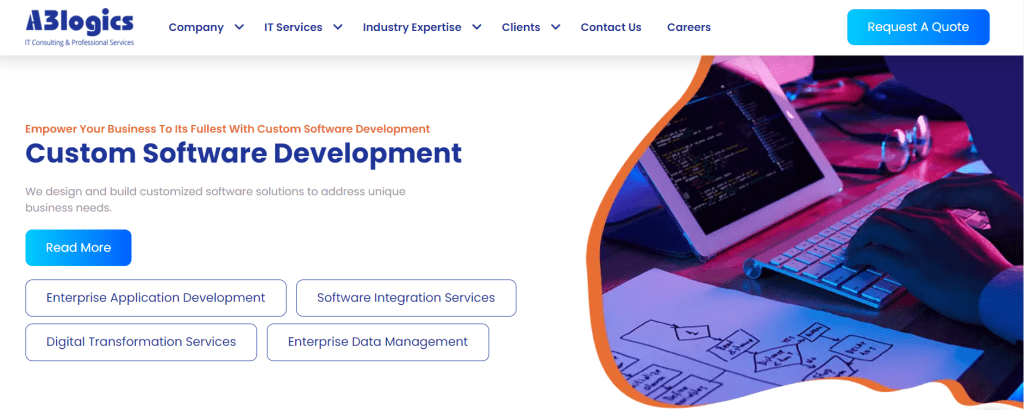
2. Kilowott
Kilowott is a boutique business experience transformation firm accelerating growth for businesses of all sizes across industries by reimagining the way businesses operate and crafting digital experiences with the user at the core.
Kilowott’s design heritage coupled with their digital transformation expertise and deep focus on user experience helps them stand apart from the crowd. All their business experience transformation engagements focus on enhanced digital customer experience while driving up business profitability.
Kilowott’s cross-platform application developers have extensive experience in developing solid, scalable iOS applications. Kilowott develops custom cross-platform software for a variety of industries, throughout the world. They assist you in developing a solution that showcases your authentic voice in a store with millions of apps.

3. iTechArt Group
The iTechArt Group is a cross-platform development business with years of experience. The app agency has produced a large number of apps using the React Native, Flutter, Cordova, and Xamarin platforms. Over 200 clients across more than 30 sectors are served by iTechArt, the leading cross-platform app development business. The multi-platform app development team at iTechArt Group has established a solid reputation for creating potent, scalable products that are well-liked by consumers all around the world. They are equally proficient in cloud and web solutions.
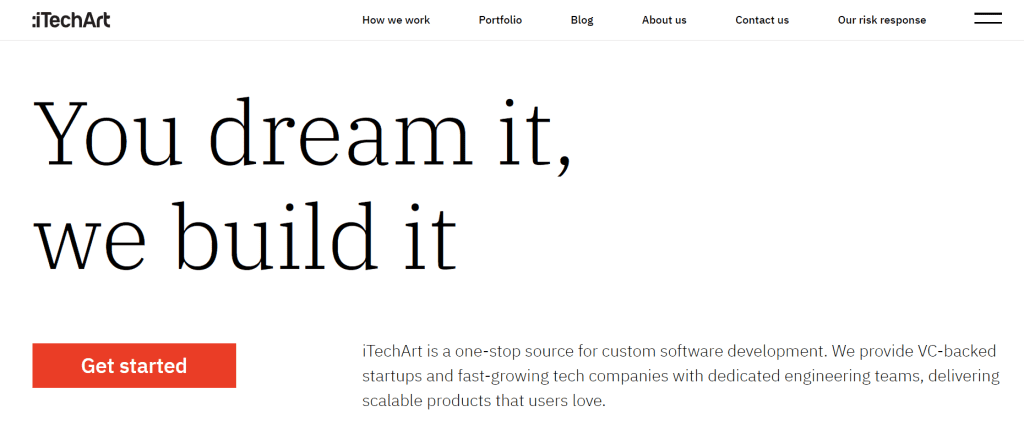
4. Digiryte
Digiryte, one of the UK’s top companies for multi-platform app development, offers reliable cross-platform services. Excellent value-added services are offered by the cross platform mobile app development company, including ideation and road mapping, software development, growth services, staff augmentation, and venture capital advice. The development team at Digiryte, a leading provider of cross-platform mobile app development, is committed to staying on top of the newest and most cutting-edge technologies.
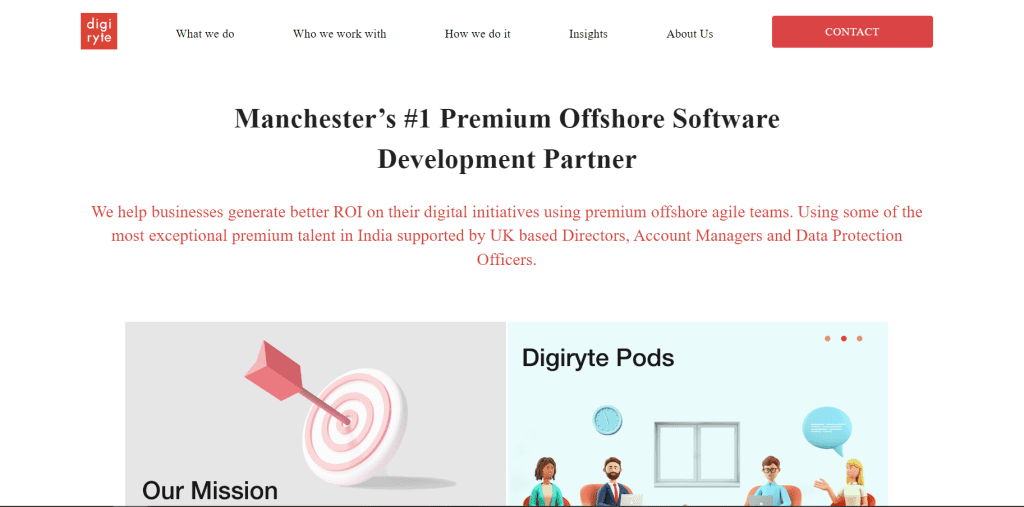
5. Miquido
One of the top businesses for cross-platform app development is Miquido, which has been in business for more than 9 years. They have experience in a variety of industries and have developed a specialty for creating highly effective apps with top-notch security measures and straightforward frameworks. The experts of cross-platform apps, Miquido’s solutions for the e-commerce, banking, and insurance industries operate without hiccup on both Android and iOS platforms and do away with the difficulty, complexity, and high cost of native frameworks.

6. 247 Labs
247 Labs Inc. is a committed team of app developers, designers, testers, product owners, and architects. It is an app development service that comprehends the needs of its clients. A head start for the business can be gained by using the cross platform apps development company’s significant experience in creating cross-platform applications.
The leading cross platform apps development firm, 247 Labs Inc, continues to provide top-notch app development services with cutting edge technological breakthroughs and customized services for clients worldwide.

7. GeekyAnts
One of the leading firms for developing cross-platform apps, GeekyAnts is renowned for its effectiveness, dependability, and award-winning apps. The business, which was established in 2006, has offices in Bangalore, India, and London, UK. Top-notch web and mobile app development services are provided by GeekyAnts using technologies like React, React Native, Flutter, Vue, Angular, NodeJS, Laravel, Python, etc. They have a history of producing amazing apps, and they collaborate with leading digital companies like Google.
They have solid expertise working with practically every industry, including those in manufacturing, marketing, consumer goods and services, education, healthcare, and medicine, as well as e-commerce. Additionally, GeekyAnts employs some of the top cross-platform app developers that have a wealth of knowledge and expertise in creating top-notch cross-platform apps.
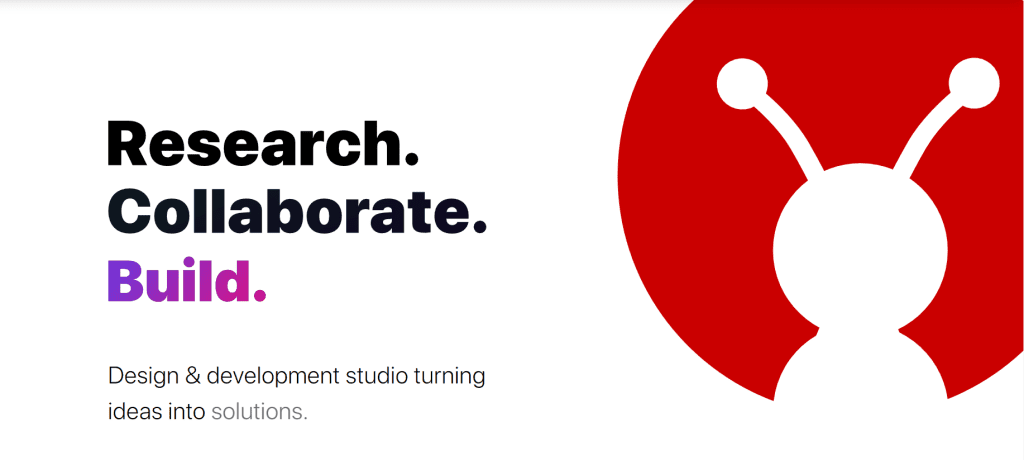
8. ArcTouch
ArcTouch, a renowned team of innovation consultants, growth hackers, designers, multi-platform mobile app development experts, and data scientists, creates high-caliber cross-platform applications using the Xamarin framework.
The company that develops multi-platform mobile apps, with offices in three different cities including New York, San Francisco, and Florianópolis, nonetheless takes on projects that are distinctive. ArcTouch’s development staff is skilled enough to provide up to 75% of shared code.

9. DIGIS
One of the top firms for developing cross-platform mobile applications is DIGIS, which has offices in two different countries and more than nine years of experience in the field. The business employs more than 80 specialists who work to offer world-class services to clients.
Over 180 projects have been successfully completed by the development team at DIGIS, one of the leading cross-platform mobile application development companies. With over 80 clients served globally and a success record of 98 percent, the company is still growing in the app development sector.

10. Table XI
Table XI is a mobile app development company that has over 16 years of expertise and assists companies in achieving their objectives. The cross-platform application development company currently has more than 100 partners and a staff of over 40 talented professionals. In order to create cross-platform apps that offer a native-like experience, Table XI, the leading provider of cross-platform application development, believes in investigating new tools. The Table XI development team is a firm believer in making products mobile-friendly.
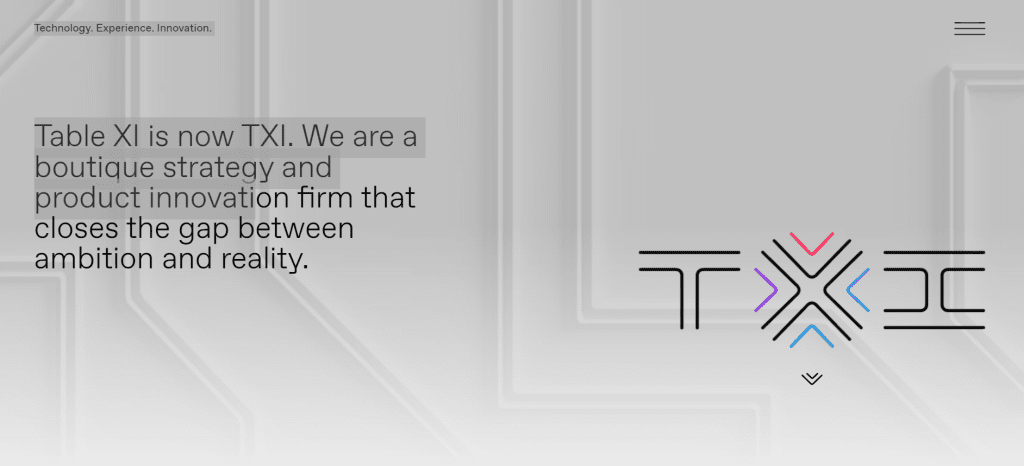
There is nothing left to do but wait and see how these frameworks compete with one another to stay in the competitive market and how well they fare against the new frameworks that are currently entering the market after taking into account all of the best options that a capable cross-platform app development company is looking for in this field.





